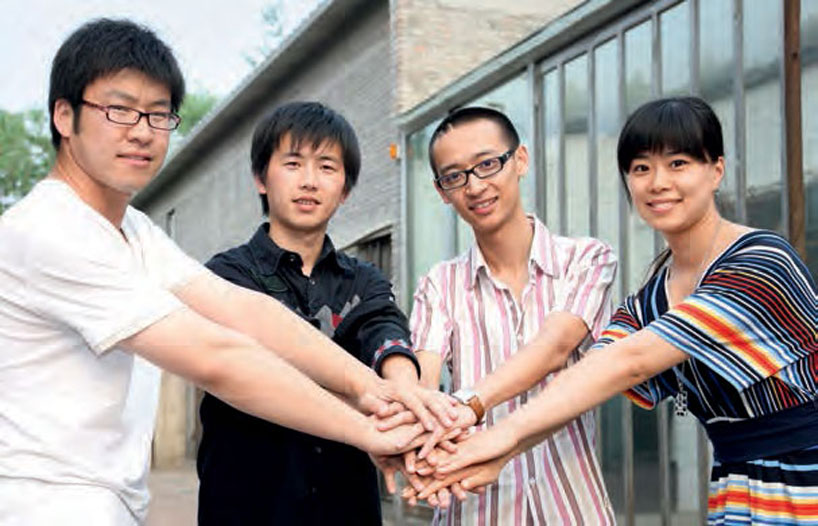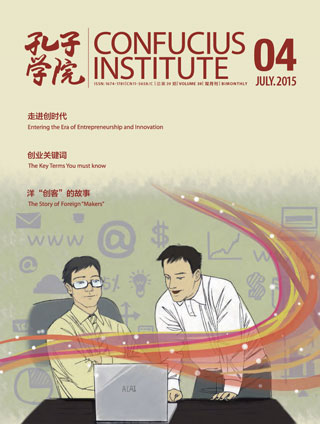
Entering the Era of Entrepreneurship and Innovation in China
Stimulated by the favorable environment for startups, more than 10,000 new enterprises are being registered each day in China, averaging 7 new companies per minute. This has been described as “China embracing its fourth wave of entrepreneurship”.
If someone were to ask What is the hottest topic in China today?
The answer would definitely be starting up businesses.
During this year’s sessions of the National People’s Congress and the Chinese People’s Political Consultative Conference, Li Keqiang, member of the Standing Committee of the Political Bureau of the CPC Central Committee and premier of the State Council, called for promoting the concept of “Letting everyone start up their own businesses and everyone be an innovator” as the “double engines” for driving China’s economic growth in his Government Work Report.
It is by no means a coincidence that the concept of “Letting everyone start up their own businesses and everyone e an innovator” appeared in the Government Work Report.
This concept was first proposed at the Summer Davos forum last year, when Premier Li called for a new nationwide wave of “people starting up their own businesses” and “startup companies created at the grassroots”, so that “millions of people will start innovating” and “everyone can be an innovator”.
Later, he illustrated this concept on various occasions, such as the first World Internet Conference and the meetings of the Chinese State Council.
On May 7th this year, Premier Li visited the Chinese Academy of Sciences and Zhongguancun Innovation Street in Beijing. He walked into 3W Coffee and talked with many new entrepreneurs about their startup experiences and innovative ideas; he also visited Legend Star and inspected the range of services they offered to entrepreneurs in the science and technology sector, and spoke with trainee entrepreneurs who had come from all over China… Wherever he goes in China, he would meet with local young entrepreneurs, and encourage them to tap into their potential for entrepreneurship and innovation. He emphasized that entrepreneurship and innovation should become a trend and serve as a new and powerful driving force for economic and social development.
Just as dropping a pebble can cause a thousand ripples, the encouragement from the Chinese government has brought about a tide of entrepreneurship.
Stimulated by the favorable environment for startups, more than 10,000 new enterprises are being registered each day in China, averaging 7 new companies per minute. This has been described as “China embracing its fourth wave of entrepreneurship”.
Entrepreneurship and innovation guarantee employment and encourage development
An inescapable fact: With a labor force of more than 900 million people out of a population of 1.3 billion and its economic development entering a new era, China is under increasing pressure to find employment for its workforce as it struggles with emerging structural problems in its labor market.
Meanwhile, resource and environmental constraints are increasing and the power of the input-driven economy is weakening; traditional high investment, high energy-consumption and extensive development models are no longer sustainable. Thus increasing market forces are required to transform the economy from one that is input and investment driven to one that is driven by innovation.
Last year, urban employment in China increased by 13.22 million, hitting a record high; however, the increase in GDP in the same year was the lowest on record.
The relatively low increase in GDP has given rise to a relatively high increase in employment. To secure economic development is to guarantee employment, but even a low rate of economic development can maintain stable employment. The key is to ensure thatjob seekers have access to employment opportunities or are able to start businesses.
“It’s inevitable,” said Mr. Ning Jiajun, “that the concept of’ Letting everyone start up their own businesses and everyone be an innovator’ is being promoted at the current stage of China’s economic development. To transform and move China to a middle-high tier economy, it’s very important to bring together the knowledge of millions of Chinese people and encourage them to become more proactive. That’s the reason for our slogan-Entrepreneurship and Innovation.” Mr. Ning is Chairman of the Expert Committee at the State Information Center.
Incentive policies benefiting entrepreneurship and innovation
Beside encouragement, various unfavorable systemic limitations to entrepreneurship and innovation must be eliminated through reform and structural innovation to stimulate market forces.
Since last year, policies benefiting new and innovative businesses have been introduced one after another.
Statistics show that in the past year alone 13 official papers facilitating innovation and entrepreneurship have been issued by the State Council and other relevant departments. Policies include streamlining administration, delegating power, providing financial support and other supportive measures to encourage and help people to start up businesses.
This year, an increasing number of incentive policies are being introduced, and new policies and measures encouraging entrepreneurship and innovation are being continuously perfected and amended.
In January, policies and measures to promote mass entrepreneurship and innovation through the development of a Mass Makerspace were examined and approved by an executive meeting of the State Council.
In March, Guiding Opinions of’ the General office of the State Council on Developing Mass Makerspaces and Promoting Mass Innovation and Entreprenenrship was off dally issued.
In June, the State Council issued Opinions of the State Council on Several Policies and Measures for vigorously Promoting Mass Entrepreneurship and Innovation, which stated that deeper reform should take place to create a favorable environment for those starting up businesses, that a needs-oriented approach should be adopted to stimulate startup companies, and relevant policies should create synergy to ensure their implementation.
Recently, the Office of the State Council published Opinions of the General Office of the State Council on Supporting Migrant Workers and Others in Returning Home and Starting up Businesses, which introduced five policies and measures to support migrant workers, college graduates and veterans to return home to start up businesses, the first of which was to lower the requirements to starting a business for those returning home.
All these give a clear signal that entrepreneurship and innovation are receiving high-level support and being elevated to an unprecedented level in China’s economy.
The effect of these policies is to bring out the potential of the whole society and stimulate people’s enthusiasm to start up business and innovate. Statistics show that in the 12 months that ended in April 2015, 1.346 million new enterprises were registered in China, an increase of 12%. Among them 935,000 were sole traders, an increase of 17.1%. In May, numbers showed that many more people chose to start up their own businesses, as the proportion of those who were self-employed rose by 0.12 percentage point compared with January.
“Internet +”brings new impetus for entrepreneurship and innovation
On June 24th, three months after the term “Internet+” first appeared in the Government Work Report, Guidance for Implementing Internet+ was endorsed at an executive meeting of the State Council, which put forward concrete measures to promote deeper integration of the Internet and traditional businesses. This symbolized the adoption of the new Internet+ development model in China’s national action plan.
Ouyang Rihui, deputy director of the China Center for Internet Economy Research at Central University of Finance and Economics, told reporters that the benefits of Internet+ can be seen from two perspectives: one is that traditional industries can transform themselves by using the Internet and associated technology to improve their efficiency; the other is that the Internet can facilitate the development of new products and new industries by integrating different business sectors. Therefore, not only can Internet+ facilitate the transformation of China’s economy, but also bring new opportunities for everyone to start up their own business and become innovators.
Daicy, once a senior executive at a listed company, sensed an Internet+ business opportunity and started up her own business at the end of 2013. She mortgaged her home and made Wecook, a mobile app with the motto “love to cook, cook to love”, which offers intelligent online cooking instructions and delivers ready-prepared ingredients offline. By now, the app has amassed nearly 2 million registered users. In March, it attracted 30 million RMB in its first round of venture capital funding, with an evaluation of 150 million RMB.
In the age of Internet+, such inspiring stories emerge almost daily.
The Internet mindset and the 020 (Online-to-Offline) Internet business model has eliminated barriers that entrepreneurs once faced Some say that China has already entered the age of Web 3.0, with more and younger entrepreneurs who were born in 1980s and 90s, more freedom for entrepreneurs like Internet+, more venture capital funding, and a fairer environment for those starting businesses. All these are promoting innovations in business operations, management systems, and above all, technological research and development.
Young college students become the new force behind Entrepreneurship and Innovation
EME Technology, established by a group of students at Guangdong University of Foreign Studies, recently received seed investment of 2 million RMB from an angel investor. EME Technology is a mobile Internet company based on the 020 model, but adapted for college life. It is dedicated to facilitating “the last kilometer” of courier deliveries, to do away with the inconvenience of students receiving courier deliveries on college campus.
Mr. Miao Zhuangzhi, the founder and CEO of EME Technology, noticed that courier delivery service within the college campus was a promising business opportunity waiting to be developed. He led his team to upgrade their Emitong Life platform on WeChat and started providing a campus courier package collection service, which was well received during the Double Eleven (November 11th) shopping holiday in 2014. The newly available EME app has only been online for 28 days, but it has amassed more than 20,000 realname registered users.
Young college students, as the most innovative and able pool of talent, will no doubt become the driving force to help “everyone start up their own businesses and everyone be an innovator”.
Lately, the inaugural meeting of the Chinese University Innovation and Entrepreneurship Education Alliance was held at Tsinghua University, which marked the official launch of the first alliance of its kind consisting of 137 Chinese universities and 50 enterprises, institutions and community groups.
According to sources, all members of the Alliance will participate in the research and study of educational concepts, methodologies and mechanisms to encourage innovation and entrepreneurship. Their aim is to encourage universities to cooperate in all forms of education to facilitate innovation and entrepreneurship, achieve pooling of resources, coordinate development to achieve betterment for all partners, and to supply innovative enterprises and startup businesses with even more college graduates.
How can dreams be realized in reality?
Dreams are full of possibilities while opportunities are scarce in reality.
When the concept of “Letting everyone start up their own businesses and everyone be an innovator” becomes a trend, and more and more ambitious and passionate people start up their own businesses, entrepreneurship and innovation will have brought along new opportunities, but also new challenges.
According to research, approximately 65% of college students in China would like to start a business, but only 3% succeeded, which is much lower than the 20% success rate for American college students. Students who took part in the study said that the major barriers to a successful startup business included lack of experience (67.7%), lack of money (48.5%), lack of capability (46.4%) and lack of effective guidance (37.7%).
“Starting up business requires mental stamina, instead of a mere impulse and a burst of enthusiasm,” said Zhang Yi, an expert in brand management and corporate research. “It calls for a logical business mind. Many people would like to start a business, they are keen and have ideas, but they don’t have a business mind, so they invariably fail.”
Zhang Yi pointed out that Premier Li, when visiting Zhongguancun Innovation Street, spent more time at Liu Chuanzhi’s Legend Star. Zhang believes that this is because entrepreneurs are more in need of an established incubation apparatus like Legend Star than Chuarrgker Space. New hi-tech products, science and technology-based enterprises and startup businesses should be “incubated” to promote cooperation and exchange between enterprises, to enable entrepreneurs to turn inventions and discoveries into marketable products as soon as possible. Newly established small to medium-sized enterprises should be supported with a comprehensive range of services to help them grow and mature, so as to minimize the risks and costs of starting up a business, increase their chance of survival and success, and to help enterprises become bigger in scale, ultimately helping to produce successful enterprises and entrepreneurs.
































No hay comentarios:
Publicar un comentario